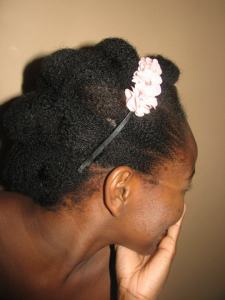 ‘Hey so what, who cares, why make such a big deal about natural hair? And besides it’s so untidy, it does not look nice, I would never wear my hair like that!’ These are just some of the comments I receive when the conversations about natural hair start to fly around the room, or coffee shop, or in the street, where people stop me wondering if my curly kinks are a wig. The fact is, this is not the case. It is not just hair, natural hair has become a more political statement than any other part of the ‘human physique’ has and has even turned into what most people call a conscious ‘lifestyle choice’. Since when has wearing your own hair the way it is ‘grown’ become a conscious lifestyle choice? It should just be natural to do so right? But it is not. The fact is that natural hair currently does not fit into the mould of what black people, yes I said black people, consider beautiful, and yes sure, let’s use scapegoats and blame this on what the world sees as acceptable beauty in magazines, or let’s use more excuses and say that we never learned how to take care of our hair, or even better that we would be seen as unaccomplished ‘village people’ if we wear our natural hair, and to an extent this is a hard truth for a lot of people…but let’s be a bit controversial…maybe it’s just the fact that we are just not comfortable in our own skin, and let’s face it, natural hair is the embodiment of what makes us unique in who we are: so the solution then becomes spending thousands of dollars in weaves, wigs, lye and whatever else can straighten out our hair to make us look like the norm.
‘Hey so what, who cares, why make such a big deal about natural hair? And besides it’s so untidy, it does not look nice, I would never wear my hair like that!’ These are just some of the comments I receive when the conversations about natural hair start to fly around the room, or coffee shop, or in the street, where people stop me wondering if my curly kinks are a wig. The fact is, this is not the case. It is not just hair, natural hair has become a more political statement than any other part of the ‘human physique’ has and has even turned into what most people call a conscious ‘lifestyle choice’. Since when has wearing your own hair the way it is ‘grown’ become a conscious lifestyle choice? It should just be natural to do so right? But it is not. The fact is that natural hair currently does not fit into the mould of what black people, yes I said black people, consider beautiful, and yes sure, let’s use scapegoats and blame this on what the world sees as acceptable beauty in magazines, or let’s use more excuses and say that we never learned how to take care of our hair, or even better that we would be seen as unaccomplished ‘village people’ if we wear our natural hair, and to an extent this is a hard truth for a lot of people…but let’s be a bit controversial…maybe it’s just the fact that we are just not comfortable in our own skin, and let’s face it, natural hair is the embodiment of what makes us unique in who we are: so the solution then becomes spending thousands of dollars in weaves, wigs, lye and whatever else can straighten out our hair to make us look like the norm.
I am sure this has already been a hard set of paragraphs to read for a lot of people, and I am happy if it has evoked anger and indignation and maybe even a flurry of comments! It is because of this and other hard truths that we at Afrorage in collaboration with Wordweaver Publishing House decided to launch ourselves wholeheartedly into the writing of the first natural hair book for Namibia and Southern Africa. We wanted to not only change and challenge the perceptions of what women and men think of natural hair, but most importantly to also provide a guide that gives useful information on natural hair and even(drum roll) gives you advice and tips on how to take care of it! Since we started the Afrorage natural hair care range and started offering tips on how to take care of natural hair a lot of women (and men mind you!) come to us saying that they have always wanted to go natural and grow out their hair, but do not have a clue on how to start, and this is part of what we want to address in the natural hair book. It will not be the first and last book, as there is a whole wealth of information to cover, so do keep coming back to us to stay in the loop! So look out for the guide which is set to be published early this year and we hope that you get to love your natural hair and challenge natural hair perceptions, just like we do at Afrorage.
If you want to be part of the second edition of the natural hair guide, send an email to afroragebeautyessentials@gmail.com and tell us all about your hair journey!
Sharon Kasanda, co-founder of Afrorage, is a writer, entrepreneur and aspiring innovation champion. Her advocates are the environment, family, community upliftment through women empowerment, and all things natural.


